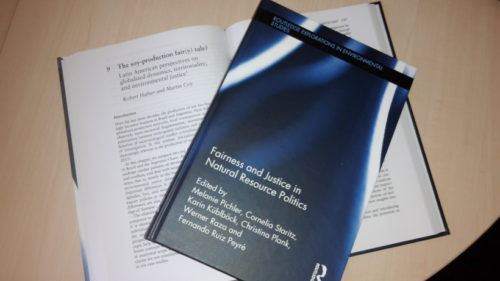I am delighted to present a new Routledge book with active participation from members of our work group!
Fairness and justice in natural resource politics.
Pichler, Melanie; Staritz, Cornelia; Küblböck, Karin; Plank, Christina; Raza, Werner; Ruiz Peyré, Fernando (eds.) (2016): London, New York: Routledge (Routledge explorations in environmental studies). ISBN: 9781138195950
About the Book
As demand for natural resources increases due to the rise in world population and living standards, conflicts over their access and control are becoming more prevalent. This book critically assesses different approaches to and conceptualizations of resource fairness and justice and applies them to the analysis of resource conflicts.
Approaches addressed include cosmopolitan liberalism, political economy and political ecology. These are applied at various scales (local, national, international) and to initiatives and instruments in public and private resource governance, such as corporate social responsibility instruments, certification schemes, international law and commodity markets. In doing so, the contributions contrast existing approaches to fairness and justice and extend them by taking into account the interplay between political scales, regions, resources, and power structures in “glocalized” resource politics.
Various case studies are included concerning agriculture, agrofuels, land grabbing, water resources, mining and biodiversity. The volume adds to the academic and policy debate by bringing together a variety of disciplines and perspectives in order to advance both a research and policy agenda that puts notions of resource fairness and justice center-stage.
Here is the contribution:
Chapter 9:
The soy-production fair(y) tale? Latin American perspectives on globalized dynamics, territoriality, and environmental justice
Robert Hafner & Martin Coy
Brazil and Argentina are now fully incorporated in globalized value chains. Local consequences of globalised activities are observed. Rising demands allow for diversified producer strategies from mere focus on pricing and availability to socio-ecologically sound and “fair” production. Given this socio-economic framework, the chapter deals with theoretical considerations of fairness and empirical experiences of soybean production and commercialization.
Expanding the Environmental Justice approach with territoriality, the Argentine Chaco and Brazil’s Mato Grosso Region, two frontiers of soy production, are investigated along two axes: (a) territoriality and production related conflicts with locals; (b) discourse of opposing thought styles on soy production and their consequences.

